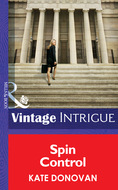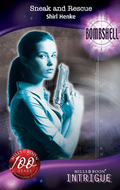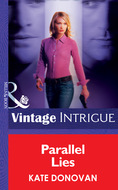Kitap dosya olarak indirilemez ancak uygulamamız üzerinden veya online olarak web sitemizden okunabilir.
Kitabı oku: «Deadly Desire»
A strange man was trying to get into her hotel room.
She saw he had a gun.
Her gut instinct said to run the hell away from him, but inside that room was the only weapon she had to save her father’s life and many others. She couldn’t leave it.
Dropping into a fighting stance, she waited.
The man gave her a look like she was crazy and raised his gun. She lashed out with a kick aimed at his weapon arm. His arm jerked out of position, and a bullet ricocheted off the wall six inches from her.
She didn’t stop.
He fell to the floor. Jane kicked him once more, then hurried past him. Fumbling to open her hotel door, she rushed in and slammed it closed behind her, then reached for the phone to call security.
Someone was clearly after her – and her antidote. But who?
ABOUT THE AUTHOR
Katherine Garbera has had fun working as a production page, lifeguard, secretary and VIP tour guide, but those occupations pale when compared to creating worlds where women save the day and wounded hearts are healed. Writing romantic suspense novels is the perfect job for her. She’s always had a vivid imagination and believes strongly in happily-ever-after. She’s married to the man she met in Walt Disney World’s Fantasyland. They live in Central Florida with their two children. Readers can visit her on the web at www.katherinegarbera.com.
Deadly Desire
KATHERINE GARBERA
MILLS & BOON
Before you start reading, why not sign up?
Thank you for downloading this Mills & Boon book. If you want to hear about exclusive discounts, special offers and competitions, sign up to our email newsletter today!
Or simply visit
Mills & Boon emails are completely free to receive and you can unsubscribe at any time via the link in any email we send you.
This book is dedicated to my sisters,
Linda Beardsley and Donna Sutermeister, who
shared many journeys all over the world from
our backyard – too bad that tunnel to
China never paid off! Thanks for the good
times and great memories!
Acknowledgements
Thanks to Dr John Walden, who was so generous with his time and knowledge of the Amazon. Any mistakes are my own.
Thanks also to Dr Michael Miller, who answered my questions on infectious diseases and virology. Again, any mistakes are my own.
Special thanks to Eve Gaddy, Nancy Robards Thompson and Beverly Brandt, who were my cheerleaders! And to Matt who is always so supportive and believes in me when I start to doubt.
Chapter 1
Dr. Jane Miller, virus hunter.
The words echoed in her head as she exited the elevator in the bowels of the Centers for Disease Control headquarters in Atlanta, Georgia. Entering the deepest part of the building always made her feel like some sort of superspy. Maybe it was the fact that security was as tight here as it was at the White House.
Whatever the reason, she always heard the 007 theme in the back of her head as she moved through the hallways. She passed by labs that worked with lower-level infections, such as a new strand of the flu, before reaching steel-reinforced doors with a sophisticated security scanner. The security guard smiled at her. He’d worked at the lab for about a year now.
“Good evening, Dr. Miller.”
“Hello, Stan.”
He had a nice face. He was a doting grandfather who’d embodied all the things she’d always kind of longed for when she thought of family, but had never found. “Working late again?”
“You know how I am when I get a new problem to work on.” She didn’t say anything else, leery that he might inadvertently pass along the fact that she was doing research on something sent to her by her father. Doctor Rob Miller was persona non grata as far as the CDC was concerned.
He nodded at her. “But it’s been three months and you’re still working eighteen-hour days. You’re always warning me about the effects of exhaustion.”
The truth was, she was burning the candle at both ends hoping that what she’d discovered was somehow an error. “I know, but this time…I just feel like I need to work on this project around the clock.”
“We’re used to emergencies,” he said.
She shrugged. How could she explain to him what she didn’t really understand herself? She only knew that the virus her father had sent her needed her attention. She’d received the samples almost too long ago—in the world of infectious viruses, three months could be a lethal amount of time.
She remembered when she’d received the plainly wrapped brown package. It had seemed innocent enough, but she’d recognized the angular handwriting on the outside and opened it with trepidation. Anything from her father was suspect. The CDC and her dad went way back, but the relationship was no longer one that either side liked to acknowledge.
Why had he sent it to her?
Jane flashed her badge at the reader on the wall. Then she removed her glasses and leaned forward for the eye scan. She didn’t like it, but had gotten used to it. Finally she could withstand the laser scan without blinking. The doors opened and she stepped through.
She slipped her glasses back on and noticed the biohazard warning sign that stood next to the door to the women’s locker room. She entered the facility and changed from her street clothes into scrubs. In order to enter the lab, everything had to be removed from the skin out. Jane changed as quickly as possible.
She then made her way to a second set of scanners. Adrenaline and nerves warred for control of her body. Adrenaline won. It had been a long time since she’d had anything new in her hands. Once the doors opened, she stepped inside the ultraviolet-light chamber and waited a moment before exiting. She paused again, preparing to enter the level 3 labs.
She flashed her badge one more time. Security had always been tight at the CDC and with the ever-present threat of biological warfare looming on the horizon, it had grown even tighter in recent years. The guard at this station was new and he took her ID badge and read every bit of information on it. He also had her remove her glasses for him.
She knew what he saw. A rather average-looking woman with curly red hair. In her ID photo, it looked darker, almost auburn. Her eyes were wide-set and the exact same warm brown color as her mother’s had been. Jane herself had no real memory of her mother’s eyes, but her father had mentioned it often enough when she’d been a girl.
Finally, she entered a holding area that contained the space suits. She went to her stall and pulled on the one that had her name emblazoned on it.
She exited the room and walked a short distance to the decon—decontamination—showers, which brushed over her. Then she pressed her thumb to a keypad and the door opened. “Welcome, Dr. Miller.”
The computer voice reminded her a little of the Star Trek computer. Maybe it was the space suits, but she always felt as if she’d left this world and was on a journey to another one when she stepped into the lab.
Small windowed doors lined the hall. Jane didn’t bother reading name tags or signs of what the scientists inside were working on. She kept moving until she reached her lab. Her area of expertise was Ebola, and she’d recently finished working with a new strand of the virus that had shown up in the Sudan.
Ebola was reliable and she knew what to expect. But this thing her father had sent—it was a mystery. The puzzle was still a jumble in her mind and on her microscope slide. But she felt in her gut that she was getting closer to figuring everything out.
She swiped her badge through the scanner and the door unlocked. She walked inside, hitting the light switch with her elbow. Her lab looked like every other one on this level. Long countertops lined the walls and a small office area was in the back. She could just make out her Johnny Depp poster, which hung on her large bulletin board next to the Dilbert cartoons that her college roommate, Sophia, had sent to her.
There was a sophisticated replicating machine on the end of the counter and a freezer to keep samples at the proper temperature until she was ready to use them. The freezer currently held samples of her father’s blood as well as the blood of a Yura tribesman.
The Yura were a tribe native to the Amazon. Some of them lived in Bolivia, but her father had spent the last few years with a group who lived near Manu in Peru’s Amazon basin. Their lifestyle had changed little in generations save for the introduction of modern weapons such as rifles. They still lived off the bounty of the rain forest and whatever the Amazon River and its tributaries provided.
Jane had been working with the blood samples as well as medication her father had sent and monitoring the effects of the primitive treatment.
She took the clipboard from the wall and wrote Blood samples from South America and the day’s date. She didn’t mention the Yura tribe or Dr. Rob Miller. Three damned months and finally she was getting closer to finding an inoculation that worked. She’d decided to mutate the local remedy her father had sent, a powder made from bark and leaves, to see if that would work. Today she’d find out.
The powder from the bark wasn’t a treatment. A treatment in the world of viruses was a way of stopping the virus. Kind of like a cure. But because of the nature of infectious diseases, virologists didn’t use the word cure. As soon as it was uttered, a new mutation would show up.
She’d noticed that the bark wasn’t a treatment after she’d administered a dose of the powder to the infected blood sample. It slowed the activity of the virus, but the virus returned to full strength one week later.
Jane had used her blood samples to start a colony of the mystery virus in the petri dishes. An application of the bark powder had initially slowed the spread of the virus through the petri dish, but within a week, the virus was flourishing.
The leaf used to make the remedy was related to the coca plant, which was used in the making of cocaine. Jane suspected that the side effects were more than just relief from pain.
There were no real healing properties in the plant. This meant that anyone using this remedy wouldn’t live. They’d alleviate the symptoms for a time, and wouldn’t be in pain while the disease spread throughout their body, but the virus would win in the end.
“Hey, Jane,” a man said, from her doorway.
Jane glanced up to see Tom Macmillan, another scientist who worked on her floor. What the hell was he doing here? She didn’t want anyone in her lab on the off chance it would get out that her father was involved in her current project.
Tom was an expert who worked with E. coli. He’d spent four years working in a monkey house in Africa, studying the multigenerational effect of the disease.
“What’s up, Tom?” she asked. Everyone was really too busy to ever just hang out and chat in the labs.
“This came for you. Since I was coming back to start work, I told Angie I’d bring it.”
Jane reached for the package and saw the same angular handwriting that had been on the last package from her dad. Her heart stopped for a second. The situation with the Yura must be escalating if he’d sent something else.
“Do you know what that is?” he asked.
Jane debated for a second, but being evasive would only raise his suspicion. “Some samples I was asked to consult on by a virologist currently living in Peru.”
“Infectious?” Tom asked. He was a little geeky, but sexy in his own way. Tall and lanky, he wore horn-rimmed glasses that looked good on him. His eyes were hazel and changed color sometimes with his moods.
Right now his eyes were the swirling gray-green of the Atlantic when a hurricane stirs through—excitement, she realized. He stared at the clipboard in her hands.
He loved it when they got a new disease. And he wasn’t the only one. There was a reason why they all worked back here, away from the public. Why they spent so much time in the lab. They all were obsessed with watching life change in their petri dishes. There was nothing quite like taking a potentially big biological threat and reducing it to nothing.
“Oh, yeah. I’ve been trying to find a treatment. This must be some new blood samples.”
“Want some help?” he asked. He rubbed his gloved hands together as he stepped into her lab.
“Don’t you have your own work to do?” She was reluctant to involve anyone else in this project until she had a firmer grasp on what her dad had sent.
“Yes, but I needed a break. I’m missing something and staring at the strand I’m working with isn’t helping. Maybe solving your problem will help me,” Tom said.
“Solving my problem? Tom, you do have a God complex.”
“Ha. Stop teasing me. I know you’ve been working around the clock in here. You need some fresh eyes.”
He was right. She went to her office and returned a minute later with the note from her dad.
“This is all I’ve got to work with,” she said, handing the note to him. “So far I’ve analyzed the viral strain and it is definitely lethal. I tried all common treatments but they didn’t work. Yesterday I mutated a strain of the local remedy—a powder from this tree—and let it incubate. I’m ready to test it.”
Tom read the note. Jane already knew it by heart. She tried to keep her expression impassive.
Jane—not sure what this is, but the Yura are infected by it and so far two have died. I tried to contact the disease control office in Lima but they weren’t interested. Local practices forbid examining the deceased and the bodies were burned. I was able to get this blood sample from an infected male. I’ve also sent mine to compare it with. The symptoms include fevers, hemorrhaging, swelling, shock and convulsions. I’m enclosing the local treatment. The bark and leaf are ground together to make a paste and then ingested. The treatment relieves symptoms for a 48-hour period before it has to be ingested again.—Dad
He’d included the coordinates of the tribe’s location in the jungles of Peru. She’d already tracked the location on her own GPS unit.
“Rob Miller sent this letter. Is that from him, too?”
“Yes.” She didn’t elaborate. If he was like half the other scientists at the CDC, he’d leave now. Instead he just watched her.
“What’d he send this time?”
She went to a low workbench and opened the desktop freezer. Blood samples were submitted to the lab in a frozen form, something that had bugged her about her dad’s original package. Where had her dad found a facility to do this kind of work? Especially since he mentioned that the CDC office in Lima hadn’t been cooperative.
And if he’d had a lab do the freezing, why hadn’t he stuck around to analyze the samples?
His first package had contained the Yura blood sample and a second, her father’s, as an uninfected sample from the same environment. He’d included a piece of tree bark with a small bud and leaf still attached—the local remedy—and an insect. Possible carrier, the label in her father’s handwriting said. Jane had spent the last few months analyzing the organic medicine and hoped to find some answers soon.
She’d called a peer at the World Health Organization in South America to check on the strain, but he’d assured her that there was nothing to worry about. He’d heard the rumors. They’d taken samples and conducted interviews in a village along the Amazon.
If the government officials were saying not to worry, she could be opening a can of worms. The World Health Organization and the CDC would both have consulted with the Peruvian government.
She was cautious by nature. She opened the new package. It was packaged the same way the original one was. Only this time the note on the packaging was labeled, Male Caucasian, 55 years old, Rob Miller.
Another sample of her father’s blood. Her heart beat just a little faster. Did he suspect he’d been infected? Oh, man. He’d better not be infected.
She still had a lot of things to say to the man. And…she pushed the thoughts aside. Now she was going to have to test his blood sample. She wished Tom wasn’t here.
There wasn’t anything she could do about it now. Find a treatment, then worry about her father.
“Tell me what you need me to do,” Tom said, taking the sample and going to a microscope in the corner.
“Each day, I’ve been checking the blood sample. I’ve administered the powder from this tree bark, which works as a temporary relief of this virus. But so far the change in the growth pattern in the petri dish doesn’t resemble a treatment.”
“I wonder if the insect is the carrier? It could have been a primate. Did the letter indicate?” Tom asked.
She glanced at him. “No. He wasn’t sure what carried the disease, just sent this little wasp as a possibility. I’ve been concentrating on trying to isolate the virus and figure out what it is. If it’s something we’ve already identified and can treat. I’ve been varying the sample treatment with known treatments for differing fevers found in the region.”
“What’d he send this time?”
“His own blood sample. He included his with the first package to show a healthy test had been conducted. But this new sample means…”
“He thinks he might be infected. Want me to check it? He is your father.”
Did she really want Tom to do this for her? Hell, no. She’d do it. “No. Why don’t you take a look at these two slides, see what the treated and untreated blood looks like.” She pointed to the slides containing the Yura tribesmen’s samples.
Tom reached around her for the two samples before moving across the room to the other long lab table. “Let’s crack this case wide open.”
She smiled at him, trying to make sure he’d think this was a normal reaction. Trying not to let him see that she was afraid for once of the knowledge she’d always taken such pride in.
“God, you are too corny for words. Good thing you chose to go into science.”
“Why’s that?” he asked, arching one eyebrow at her.
“Any other profession wouldn’t tolerate your eccentricities.”
“Sure it would. I’m brilliant, and that kind of raises the tolerance bar,” Tom said.
“Not far enough.”
He threw his head back and laughed. “I like you, Jane.”
“Thanks, Tom. Let’s get to work.”
Tom took his sample to a corner of the lab and Jane went to work. The space-suit gloves were for her protection, but she didn’t like to use them. If she’d been alone in the lab she would have shed them. But she couldn’t with Tom here, so she worked with them on.
She took her time preparing the electron microscope, a fully computerized technological wonder that took up as much room in her lab as her large desk did. Finally, her father’s blood was being shot by the microscope’s “gun,” the lens focusing on objects too small for the most powerful light microscope to magnify. The computer screen finally showed her a photo of the tiniest of objects: a virus. Blood rushed in her ears and spots danced in front of her eyes. She reached behind her for support against the countertop.
“Jane? You okay?”
She shook her head and forced down the bile rising in the back of her throat. “Yeah. I’m fine. Let me compare this with the one you’re looking at.”
She concealed the panic and pain and infinite sadness that rose through her like a wave.
Tom didn’t say anything, just stepped back out of the way. She ordered the computer to remove the sample. She studied the slide, adjusting the light. With this level of magnification it was easier to see the infection.
Saying nothing to Tom, she inserted a new sample.
She adjusted her glasses and glanced down. The cells began to take shape on the computer screen as she searched. Slowly it came into focus.
Jane’s dad was infected with the same virus that was killing the Yura. And it was fatal.
“Where’s the modified bark treatment you made?” Tom asked.
Jane stared at him. In her mind she saw every en counter she’d had with her father.
“Jane?”
“I’m sorry. I’m a little upset.”
“I can see that. What can I do to help?”
She looked back at the slide again, this time as a scientist and not as a daughter. She looked at the cells and how they’d replicated. It seemed similar to Lassa fever, which was diagnosed by analyzing the platelets.
“Yes. Fine. Let’s try the treatment.” Jane left Tom and went to the refrigerator where she’d stored the batch from yesterday. This was the third mutation of a possible treatment she’d made.
She returned to Tom and administered a drop of it, praying it would work. She did the same thing with the other infected sample. Then, using a healthy blood sample of her own, she tried the treatment she’d culled from the same mutated strain.
“Well, well, well. You didn’t need me after all, Jane.”
She looked at the computer screen with Tom and saw that the new mutated treatment was indeed isolating and destroying the virus.
“I need to talk to Meredith and then call the director of the lab in Lima.”
Tom said nothing else. “I’ll run a test to see how long the treatment will stop the virus.”
“Thanks, Tom.”
Jane left the lab slowly, not wanting Tom to see her inward panic, but she walked as fast as she could. She barely tolerated the decon shower. She pressed her thumb to the keypad to activate the door. “Good day, Dr. Miller.”
Jane sprinted to her locker, stripping the space suit from her body as she moved. She dumped the space suit in the environmental cleaning bin and tugged on her jeans. Dammit, why the hell had she worn a button-down shirt today? She struggled to get her arms into the shirt and started buttoning it before she realized the damned thing was twisted.
She closed her eyes. Her hands were trembling and she knew she had to focus. This wasn’t helping anyone. She pulled the shirt off and calmly put it on correctly.
She flashed her badge at the new security guard and he keyed the door. She dashed down the corridor to the retinal scanner. Pulled off her glasses and bent to be scanned.
The door popped open and she forced herself to walk slowly through it. Stan waved at her as she emerged. She waved back. The urgency riding her was intense but her steps slowed as she neared her boss’s office. How was she going to explain that her father had once again stumbled onto a fatal virus?
Meredith Redding had been with the CDC for more than twenty years. Jane remembered meeting her for the first time when she did a project for her sixth-grade science fair. Meredith hadn’t looked like Jane had expected her father’s peer to look. With her straight blond hair and model-perfect features, Meredith was the type of woman people often assumed had more looks than smarts. But Meredith quickly disabused them of that notion.
She’d been very helpful and encouraging to Jane. The relationship had maintained that mentor-type balance until Jane had received her degree and taken a job at the CDC.
“What can I do for you, Jane?”
Honestly, she had no idea where to start. She took a deep breath. “I just had a breakthrough with the treatment I’ve been searching for on the virus my father sent. Did you get anywhere with the office in South America?”
Meredith pursed her lips. Then she swiveled her chair and stood.
“I’ve found a treatment that works in our initial testing. Tom is running a test on the treatment to see how long it is potent. The virus looks similar to Lassa fever, but it’s more dangerous and this new treatment is the only one that has worked on it.”
“Damn. Are you sure?”
Jane realized she was staking her reputation to her father’s, an action that had proven disastrous in the past for other virologists. “As positive as I can be in the lab.”
“If any other virologist sent it…”
“I know. But the fact that he did send it makes me want to take it seriously.”
“What aren’t you telling me?” Meredith asked.
If anyone else had asked, Jane would have kept her mouth shut. She would have never even mentioned Rob Miller’s name. But Meredith was the one person in the CDC, heck maybe in the world who’d understand the complications that surrounded her and her father. “One of the samples was Dad’s.”
Meredith flushed. “Is he infected?”
Jane clenched her hands in tight fists. Swallowing against her dry mouth, she said, “Yes.”
Meredith sank back down in her chair. She and Rob had been friends and maybe more ten years ago. Then when she’d been promoted, he’d left Atlanta and gone to Belgium to work on the AIDS-HIV project. Jane didn’t know what had happened between them, but watching Meredith now, she suspected there was still some connection.
“What do you want to do?” Meredith asked after a few minutes had passed.
“Call the office in South America and get them to move on this. I can send them my research and then they can…” Jane broke off. Meredith was shaking her head.
“What’s going on?”
“I’ve contacted them. They are sure that there is no danger of a hot-zone outbreak. In fact, they insisted we stop trying to tell them they had one.”
“Just ask them to visit the Yura.”
“A three-man team visited a village near the Yura—Puerto Maldonado—and conducted interviews and obtained samples. No one is infected.”
“The samples are definitely infected.”
“I know that you think they are.”
Jane looked at her boss with new eyes. “What are you saying?”
“That I can’t authorize you going down there.”
“Well, I’m going. Lives are at stake—my dad’s life is at stake. I know you have bosses and they aren’t going to like it, but I’m not sitting on this.”
Meredith closed her eyes and leaned back in her chair. “I can give you a week. But you’ll need to be on a leave of absence.”
Jane had never felt so angry before, but she understood where Meredith was coming from. Discoveries like the one she’d made were worth a lot of money. Both the State Department and the Peruvian government worked very closely with each other. “I need at least ten days. It’s going to take me a few days to get everything in place.”
“Okay.”
“I’ll need equipment to take with me, and some backup.” Jane couldn’t do it on her own. It was stupid to go into the rain forest without someone at her side.
“I can’t give you anyone from the CDC. But I have some contacts in the private sector that might be able to help you.”
Meredith didn’t look happy, and Jane prayed she made it to her dad before her boss pulled the plug. There were times when working for the CDC really chafed.
Jane stood and walked to the door. Already her mind was busy with everything she needed to do. And knowing she’d have to do it alone gave her a new appreciation for her father and the work he’d done. How many times had her old man come up against this kind of corporate maneuvering and come out on the other side the winner?
“Jane?”
She glanced over her shoulder at Meredith. There was something different in her boss and old friend’s eyes. Something Jane wasn’t sure she wanted to recognize.
“Be careful.”
Jane walked out the door. She planned to be more than careful. She planned to come back to Atlanta with a major success behind her.
“I will.”
Ücretsiz ön izlemeyi tamamladınız.









